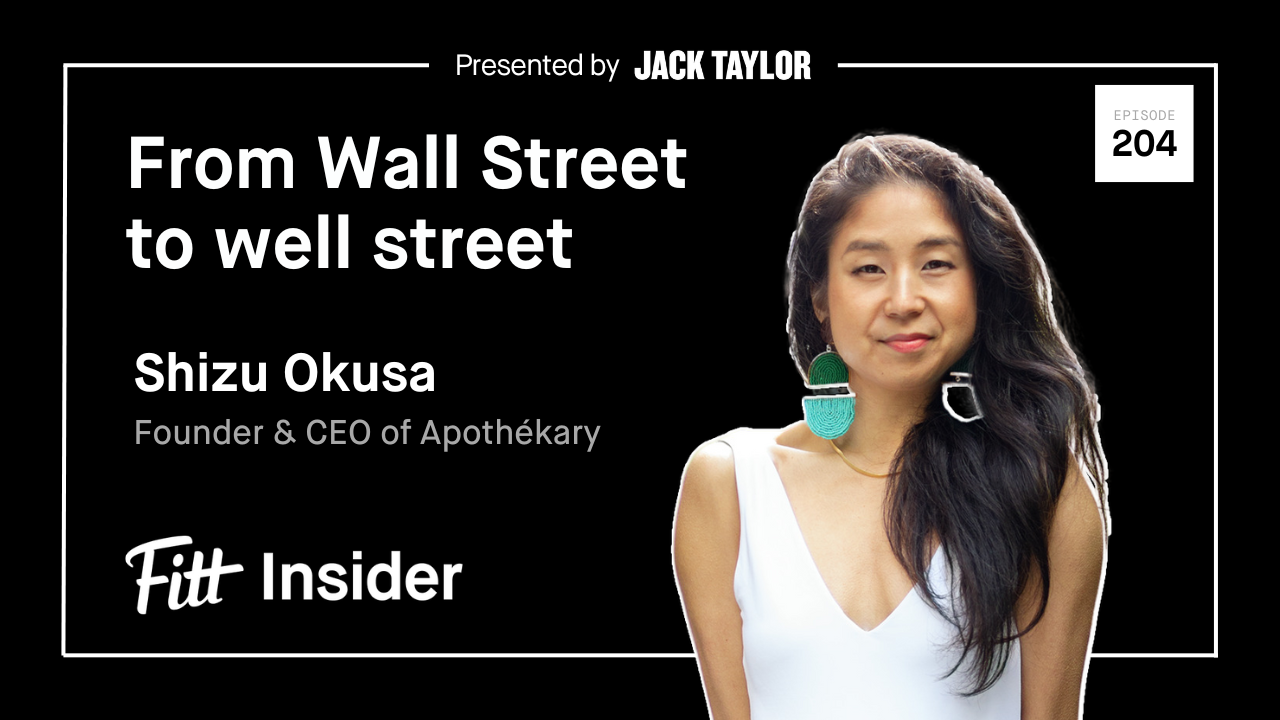Issue No. 251: Follow the Money


Affordable, no-code apps for health, fitness, and wellness creators.
Our nation’s nutrition policies are often written by the highest bidders.
The Fall of Food
No secret, the standard American diet consists mainly of unhealthy ultra-processed foods (UPFs) shown to be addictive, obesogenic, and downright lethal.
- 68% of the US food supply is categorized as “hyper-palatable,” made with levels of sugar, sodium, or carbohydrates that make them addictive to humans.
- In recent years, consumption of UPFs as a percentage of daily caloric intake has risen to 57%, while whole foods eaten dipped to a low of 27%.
- 1.6K Americans die daily from chronic diet-related illnesses, primarily obesity, diabetes, heart disease, and cancer.
Adding to this preventable loss of life, the food we eat is also devastating our economy, environment, and healthcare system. Yet, despite this reality, the individual and societal harms of subsisting on toxic foods continue to be ignored.
While personal responsibility and food scarcity are not to be discounted, it’s important to examine the policies and playbooks that make choosing healthy options harder.
Under the Influence
Big Food and Bev companies go to great lengths to keep us hooked on their products.
In the latest instance of impropriety, The Washington Post uncovered a shady social media campaign led by industry insiders.
The report found that American Beverage Association, the lobbying group behind brands like Coca-Cola and PepsiCo, paid dietitians, physicians, and fitness influencers to post about the #safetyofaspartame.
This coordinated effort was meant to combat the World Health Organization’s recent warning about potential health risks of the artificial sweetener, a key ingredient in diet soda.
Marketing misinformation. Not an isolated instance, The Post said this tactic is part of a new playbook where the food and beverage industry uses dietitians and other credentialed experts to spread contradictory health information:
“Companies and industry groups paid dietitians for content that encouraged viewers to eat candy and ice cream, downplayed the health risks of highly processed foods and pushed unproven supplements — messages that run counter to decades of scientific evidence about healthy eating.”
Nothing new, entrusting our health to online fitfluencers and wellness gurus is a bad idea. However, further evidence that basic nutrition is being intentionally manipulated for the benefit of junk food brands should be a wake-up call.
Most troubling, these ploys are hitting their mark with a captive, trusting audience.
- 40% of Americans regularly see food and nutrition content on social media.
- 67% of consumers trust the food and nutrition info they receive from influencers.
- 60% follow their recommendations, but 68% report seeing conflicting claims on which foods to eat or avoid.
Following precedent. Unfortunately, this is just the latest instance of the nation’s guiding institutions turning a blind eye to our deadly diet.
In the 1960s, the sugar industry paid Harvard scientists to downplay the link between sugar and heart disease, instead vilifying saturated fat as the culprit — the study, published in New England Journal of Medicine with no disclaimers, was used in the development of US food guidelines.
And Big Food still spends big bucks to shape nutrition policies — including payments to the Academy of Nutrition and Dietetics and American Academy of Pediatrics, among others.
Along those lines, earlier this month, a STAT report detailed Big Food’s persistent efforts to infiltrate government agencies in order to peddle influence with policymakers — a scheme that has proven successful.
Punchline: Willpower debates aside, Americans are burdened with deciphering food fact from fiction in a world where data is manipulated for dollars. Short of policy intervention, steering people toward healthier choices starts with transparency.
🎙 On the Podcast

Apothékary founder & CEO Shizu Okusa discusses an East-meets-West approach to medicine.
After exiting her last company, Shizu set out to disrupt the supplement space by launching a plant-medicine “farmacy.” Combining ancient wisdom and modern science, Apothékary’s herbal blends trade chemical compounds for clean ingredients.
We also cover: bootstrapping growth, expanding into offline experiences, and developing science-backed supplements.
Listen to today’s episode here.
🛠 Apple’s glucose tracking quest continues
The tech giant’s top-secret effort to develop a noninvasive glucose monitor is under new leadership. Tim Millet, the company’s VP of platform architecture, was recently tapped to head up the division.
Catch up: In February, the 12-plus-year-long project hit a breakthrough, proving its needleless, chip-powered blood sugar device works — but it’s still too large for the Apple Watch.
Millet, a 19-year Apple vet and Mac chip expert, could be key to helping the team shrink its proof-of-concept to wearable size.
Apple M.D. Apple’s ambition to become the “center of health” was underscored in its 2022 health report. Since then, it has teed up new tools for mental and physical well-being.
- June 2022: WatchOS 9 upgrades sleep, exercise tracking, and more, while adding an AFib History feature, supported by an FDA-approved ECG.
- June 2023: Targeting mental health, it adds mood tracking to its Health app and releases Journal, a mindfulness-inspired diary app.
- July 2023: The company readies next-gen AirPods that screen for hearing issues and sense body temperature changes.
Long term, Apple envisions a future where wearable data is shared seamlessly between doctors and patients, enabling hyper-personalized treatment plans. And, building in accountability, it’s developing an AI-powered health coach to tie it all together.
Looking ahead: Ubiquitous and armed with capital, Apple has become a one-stop shop for consumer healthcare. Now, committed to revolutionizing the healthcare industry, it’s gradually progressing from preventative wellness monitoring to FDA-approved tech and medical devices.
Presented by Youll
📱 Be everywhere
Instagram, YouTube, TikTok, a website — your business is everywhere.
Everywhere except the App Store, that is…
Upgrade your app game with Youll, a no-code app platform designed for health coaches, personal trainers, and wellness professionals.
Developed by the team who created Headspace’s meditation app, Youll’s affordable, easy-to-use interface makes launching your very own app a reality.
Customize the branding, enable subscriptions, create a content library, and unlock new income streams—with no technical know-how—in as little as 30 days.
Ready to transform your business? Book a free demo today!
📈 Gorpcore is going public
Amer Sports, the Helsinki-based parent company of sporting goods makers Salomon, Arc’teryx, Wilson, and more, confidentially filed to go public, with a potential IPO valuing the group north of $10B.
Of note, lululemon founder Chip Wilson purchased a 20% stake in Amer in 2018. Since then, revenue has climbed 22% to $3.3B in 2022.
Gorpcouture. In 2018, hip-hop culture and high-fashion’s embrace sent demand for Arc’teryx apparel and Salomon sneakers soaring, broadening their fanbase beyond backpackers.
Then, the pandemic-era spike in outdoor recreation sparked a gorpcore craze that saw technical gear become everyday wear.
- Up 12% in Q2, The North Face counts 10 consecutive quarters of double-digit growth.
- Hiking brand Merrell reported record revenue of $764M in 2022, up 18% from 2021.
- Pushing expansion, Sweden’s Fjällräven opened stores in Palo Alto and Montana this month.
Meanwhile, partnerships like Arc’teryx x Palace, The North Face x Gucci, and Canada Goose x Reformation prove outdoor gear pairs with any lifestyle.
Zooming out: As adventure-curious consumers venture outside, brands once reserved for purists are courting recreationists, with gear equally suited for city streets or mountain peaks. A win-win, companies expand their reach, while multi-functional fits offer urbanites a gateway to the great outdoors.
Punchline: Amer Sports knows the gorpcore hype won’t last forever, but the demand for stylish transitional gear is evergreen. Fusing fashion and function with cool-factor, it aims to make outdoor apparel as big as athleisure.
📰 News & Notes
- AllTrails unveils curated National Parks guides.
- Planet Fitness ousts longtime CEO, sees stock tumble.
- Fitt Jobs: Health and fitness dream jobs, all in one place.
- Life Time, GYMGUYZ add low-intensity stretching services.
- Shake Shack taps Zero Acre Farms for better-for-you fry oil.
- Hydration beverage BioSteel files for bankruptcy, seeks sale.
- Eleiko lands US distribution partnership with Marathon Fitness.
- Therabody unveils beauty division, launches LED therapy mask.
- WeightWatchers syncs up Abbott’s CGM for diabetes management.
- Natural Cycles gets FDA nod for cycle tracking with Apple Watch sensors.
💰 Money Moves
- Pro pickleball organizations Major League Pickleball (MLP) and PPA Tour merged, backed by a $50M round led by SC Holdings.
More from Fitt Insider: Pickleball Scales Up - Craft beer company Brooklyn Brewery acquired a minority stake in nonalcoholic hop drink maker Hoplark.
More from Fitt Insider: The End of Alcohol - Beckley Waves, a London-based psychedelic venture studio, closed $3.3M in a seed round from Satori Neuro, Evolve Ventures, and more.
- Kombucha maker Health-Ade secured an undisclosed investment from iHeartMedia and Ryan Seacrest.
- Equip, a virtual eating disorder treatment provider, added undisclosed funding from existing investor General Catalyst and expanded into programs for adults.
- AI developer Guru added undisclosed funding for its growing portfolio of AI-powered applications in fitness, sports, and more.
- Combat sport training app Alta acquired Gen Z-focused fitness platform Steppen.
- Pain relief lotion brand Flexpower added NBA star Giannis Antetokounmpo as part owner.
- AI healthcare diagnostics startup Carenostics closed a $5M seed round led by M13.
Today’s newsletter was brought to you by Anthony Vennare, Joe Vennare, Ryan Deer, and Jasmina Breen.